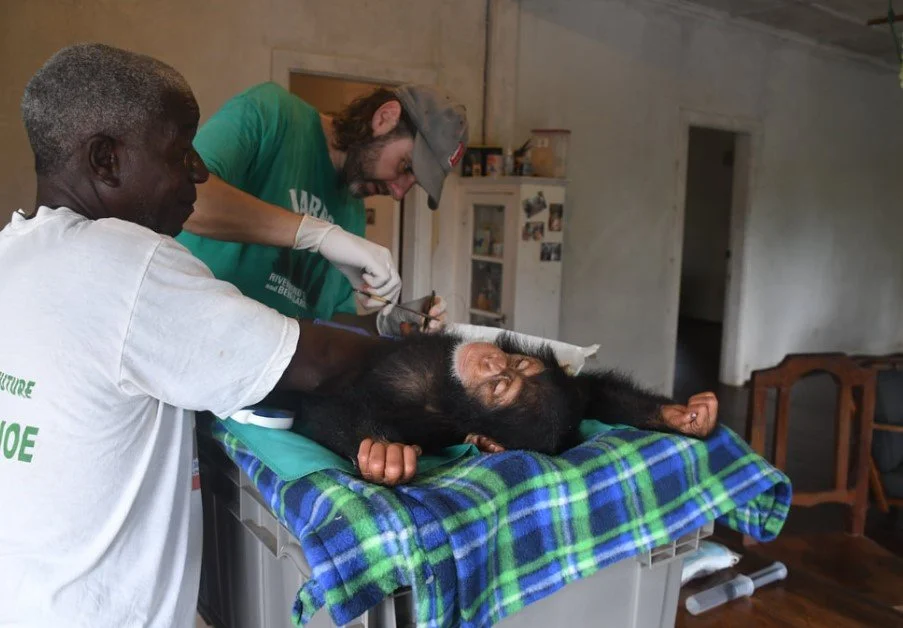World Animal Day: Interview with Jenny Desmond, founder of Liberia Chimpanzee Rescue and Protection
To celebrate World Animal Day on October 4 this year, we caught up with Jenny Desmond, co-founder of Liberia Chimpanzee Rescue & Protection, about the role that wildlife rehabilitation centres play in wildlife crime cases, and how securing meaningful legal remedies for harm could not only improve the lives of rescued chimpanzees, but also protect the future of this incredible species.
Hundreds of animals arrive into rescue centres around the world every day, victims of wildlife crime and habitat destruction, in need of care and rehabilitation. At their centre in Liberia, Jenny and her team care for chimpanzees who have been orphaned by the illegal bushmeat and wildlife trades.
While Jenny spends most of her time running Liberia Chimpanzee Rescue & Protection’s many programs and fundraising efforts, she often helps the sanctuary’s amazing caregiving team, acting as a surrogate “mom” to rescued orphans who have been confiscated in partnership with Liberian officials. Jenny, her husband Jim, and LCRP’s caregivers nurture these individuals and help them form bonds with the other chimpanzees in their care to ensure they have fulfilling lives in their sanctuary family.
Individuals who arrive at centres like LCRP often require extensive and costly treatment, and as it is nearly impossible to release chimpanzees into the wild, they will all require lifetime care.
“The costs for the rescue and care of a trafficked chimpanzee are extremely high,” explains Jenny. “Most rescue centers operate on a very thin budget and they do all their own fundraising.” What’s even more challenging is that, unlike many species, it is nearly impossible to safely reintroduce chimpanzees into the wild, meaning the individuals who arrive at LCRP will all require lifetime care.
Chimpanzees are endangered and reproduction rates are low, so removing one individual can jeopardize the survival of the entire population. In fact, each chimpanzee killed or removed from the wild results in much greater losses for generations to come.
Conservation litigation is a strategy that could hold offenders responsible, ensuring that offenders compensate wildlife rescue centres like Liberia Chimpanzee Rescue & Protection.
Liberia Chimpanzee Rescue and Protection’s Sanctuary and Conservation Center in West Africa extends for 450 acres of beautiful tropical forest and mangrove wetland, and is also home to hundreds of other wildlife species.
“We know that the impact of crime against chimpanzees is far-reaching, we know it's complex, we know it's very long-lasting,” adds Jenny. “These remedies give us the ability to address all that these impacts with a way to pay back some of the damages caused in far-reaching, long-lasting comprehensive ways that we're not really seeing right now.”
And the laws to do this already exist: in fact, as illustrated in our Legal Analysis, Liberia’s legislation provides great potential and multiple avenues for holding offenders liable for harming biodiversity, and the list of legal remedies that can be requested is extensive.
Conservation-Litigation.org is collaborating with Liberia Chimpanzee Rescue & Protection to develop a precedent-setting case to hold chimpanzee traffickers responsible for the harm they cause.
This partnership has the potential to drive real change.
“We’re building very dynamic relationships and a support network that I think will drive forward the project,” concludes Jenny. “These remedies will positively impact the future of chimpanzees and chimpanzee conservation.”



